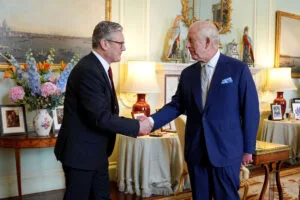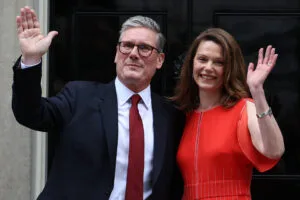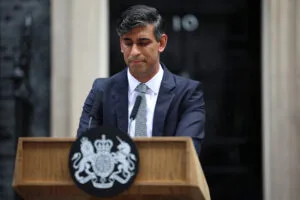Brussels – A promise of change “with stability and moderation,” a thank you to the predecessor “for dedication and hard work,” the taking up of King Charles III’s invitation to form the next government “of this great nation.” This is how Keir Starmer announced today (July 5) in front of the black door of 10 Downing Street the birth of the UK‘s new cabinet after the overwhelming result of his Labor Party at yesterday’s (July 4) early elections. “Our country has voted, decisively. For change. For national renewal. And a return of politics to public service,” the newly appointed British prime minister made clear after receiving at Buckingham Palace the royal commission to form a cabinet that will enjoy the support of the 412 Labour MPs in the House of Commons.

According to the words of the UK’s 58th Prime Minister, his task and that of the entire Labour Party will be to end the lack of trust in politics that deteriorated under previous Conservative governments from 2010 to the present, as seen by the very low turnout yesterday (at 60 percent, the second worst since 1885): “Now, this wound, this lack of trust, can only be healed by actions, not words. I know that. But we can make a start today with the simple acknowledgment that public service is a privilege. And that your government should treat every single person in this country with respect.” In a decisive passage in his first speech as leader of the country, Starmer made it clear that he will also seek to heal the bitter divisions in the electorate that have led to the exponential growth (4.1 million votes, 14.3 percent) of the sovereignist and populist Reform UK party of the architect of Brexit, Nigel Farage: “whether you voted Labour or not – in fact especially if you did not – I say to you, directly: My government will serve you” because “Politics can be a force for good – we will show that.” In other words, “country first, party second.”
With Starmer, Labour returns to government 14 years after the last government of Tony Blair, who had led the United Kingdom from 1997 to 2010 and set the two records for number of seats for Labour in the party’s history (418 in 1997 and 412 in 2001). However, in a country unaccustomed to frequent handovers between one political force and another – only seven since World War II – also complicit in the low turnout in 2024, there was one of the biggest changes in the number of seats (swing, in the jargon), which the center-left will now have to try to capitalize on in the form of government. “Our country needs a bigger reset, a rediscovery of who we are. Because no matter how fierce the storms of history, one of the great strengths of this nation has always been our ability to navigate a way through to calmer waters,” said Starmer, who has described himself as a politician “of stability and moderation.”

Addressing the “millions of people who slid into greater insecurity” while governments “for too long have turned a blind eye,” the newly appointed British prime minister reassured that “this will take a while. But have no doubt that the work of change begins – immediately.” It was a reference to the working background of Starmer, who “brick by brick” wants to “rebuild this country” after 14 years in opposition, from schools to public services, from security and “border control” to “affordable” energy and housing prices. And a call for national unity, challenged in this past decade by Scottish and Northern Irish independence: England, Scotland, Wales and Northern Ireland, “are four nations standing together again. Facing down, as we have so often in our past, the challenges of an insecure world. Committed to a calm and patient rebuilding.” With the entrance of Starmer and his wife, Victoria Alexander, through the door of 10 Downing Street, the Labour leader’s new experience of government can begin, with the announcement of the team of ministers expected as early as this evening.

Only an hour and a half earlier, Starmer’s predecessor, Conservative Rishi Sunak, announced his resignation at the same door after meeting King Charles III at Buckingham Palace. “I have given this job my all. But you have sent a clear signal that the government of the United Kingdom must change, and yours is the only judgment that matters,” were the parting words of the outgoing Premier after almost two years of governing the country. Apologizing for the Conservatives’ collapse at the polls — with only 121 seats won, yesterday’s was the worst result since the party’s founding in 1834 — Sunak said: “I have heard your anger, your disappointment; and I take responsibility for this loss.” The resigning Premier congratulated Starmer – saying, “Whatever our disagreements in this campaign, he is a decent, public-spirited man, who I respect.” Sunak also said: “I will resign as leader of the Conservatives” as soon as the modalities for selecting his succession are determined. This kicks off a tough fight for the Tories’ leadership between the few leading figures who survived the challenges of the first past the post electoral system (i.e., a dry majoritarian) in their respective constituencies.
Just after the announcement of the election results, top leaders of European Institutions in Brussels congratulated Starmer, observing the Post-Brexit UK election from the outside (for the first time since 1973, when London joined the European Economic Community): “I look forward to working with you in a constructive partnership to address common challenges and strengthen European security.,” said the President of the EU Commission, Ursula von der Leyen. The number one of the European Council, Charles Michel, spoke of a “new cycle” in London and invited the next tenant of Downing Street 10 “to the European Political Community meeting on 18 July in the UK, where we will discuss common challenges, including stability, security, energy, and migration.” The President of the European Parliament, Roberta Metsola, also congratulated Starmer, recalling that “the relationship between the European Union and the United Kingdom is rooted in our shared values and longstanding friendship” and “as allies and partners, it is in our common interest to continue working closely together.”
English version by the Translation Service of Withub





